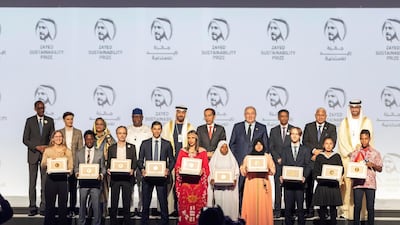The UAE has issued a fresh call to entrepreneurs and start-ups to submit their proposals for the next round of the Zayed Sustainability Prize.
Global organisations and high schools can apply for next year's prize through the online portal until May 21.
Applicants should offer long-term solutions and demonstrate their intent of improving access to essential products or services across five main categories: health, food, energy, water and global high schools.
A 12-member jury will shortlist the best projects based on their overall impact, innovation, and inspiration. The award ceremony will be held in January next year.
Through direct funding, the annual award supports social initiatives that harness new technologies to change lives for the better.
Previous winners of the prize include start-ups that have helped combat plastic waste, reduced spread of disease and improved crop yield for farmers in rural communities.
This month, 10 winners were named winners of the 2020 prize, which saw a record-breaking 2,373 proposals submitted from 129 countries.
Four winners from health, food, energy and water categories each took home a Dh2.2 million ($600,000) cash prize to fund their ongoing work, while six schools received Dh336,000 ($100,000) each.
One of the winning projects included a mobile application developed by a teen from Ghana.
In 2018, Mustapha Haqq set out to improve the lives of local farmers by helping them identify and treat plant disease through their smartphones.
To date, he has helped mitigate widespread damage to farm produce in several communities in his home country.
Now entering its 13th year, the prize has rewarded 86 winners whose solutions or school projects have directly and indirectly affected 335 million people around the world.
“We are confident the prize will continue to attract more of the world’s most dedicated innovators to submit their entries in support of resolving the world’s most pressing sustainability challenges,” said Dr Sultan Al Jaber, UAE Minister of State and director general of the prize.
What the law says
Micro-retirement is not a recognised concept or employment status under Federal Decree Law No. 33 of 2021 on the Regulation of Labour Relations (as amended) (UAE Labour Law). As such, it reflects a voluntary work-life balance practice, rather than a recognised legal employment category, according to Dilini Loku, senior associate for law firm Gateley Middle East.
“Some companies may offer formal sabbatical policies or career break programmes; however, beyond such arrangements, there is no automatic right or statutory entitlement to extended breaks,” she explains.
“Any leave taken beyond statutory entitlements, such as annual leave, is typically regarded as unpaid leave in accordance with Article 33 of the UAE Labour Law. While employees may legally take unpaid leave, such requests are subject to the employer’s discretion and require approval.”
If an employee resigns to pursue micro-retirement, the employment contract is terminated, and the employer is under no legal obligation to rehire the employee in the future unless specific contractual agreements are in place (such as return-to-work arrangements), which are generally uncommon, Ms Loku adds.
What is hepatitis?
Hepatitis is an inflammation of the liver, which can lead to fibrosis (scarring), cirrhosis or liver cancer.
There are 5 main hepatitis viruses, referred to as types A, B, C, D and E.
Hepatitis C is mostly transmitted through exposure to infective blood. This can occur through blood transfusions, contaminated injections during medical procedures, and through injecting drugs. Sexual transmission is also possible, but is much less common.
People infected with hepatitis C experience few or no symptoms, meaning they can live with the virus for years without being diagnosed. This delay in treatment can increase the risk of significant liver damage.
There are an estimated 170 million carriers of Hepatitis C around the world.
The virus causes approximately 399,000 fatalities each year worldwide, according to WHO.
The specs
Engine: 2.0-litre 4-cyl turbo
Power: 201hp at 5,200rpm
Torque: 320Nm at 1,750-4,000rpm
Transmission: 6-speed auto
Fuel consumption: 8.7L/100km
Price: Dh133,900
On sale: now
Killing of Qassem Suleimani
Results
5.30pm: Maiden Dh165,000 (Turf) 1,600m; Winner: Al Battar, Mickael Barzalona (jockey), Salem bin Ghadayer (trainer).
6.05pm: Maiden Dh165,000 (Dirt) 1,200m; Winner: Good Fighter, Richard Mullen, Satish Seemar.
6.40pm: Handicap Dh185,000 (T) 1,200m; Winner: Way Of Wisdom, Tadhg O’Shea, Satish Seemar.
7.15pm: Handicap Dh170,000 (D) 2,200m; Winner: Immortalised, Tadhg O’Shea, Satish Seemar.
7.50pm: Handicap Dh185,000 (T) 2,000m; Winner: Franz Kafka, James Doyle, Simon Crisford.
8.25pm: Handicap Dh185,000 (D) 1,200m; Winner: Mayadeen, Connor Beasley, Doug Watson.
9pm: Handicap Dh185,000 (T) 1,600m; Winner: Chiefdom, Mickael Barzalona, Salem bin Ghadayer
Name: Peter Dicce
Title: Assistant dean of students and director of athletics
Favourite sport: soccer
Favourite team: Bayern Munich
Favourite player: Franz Beckenbauer
Favourite activity in Abu Dhabi: scuba diving in the Northern Emirates
Specs
Engine: Dual-motor all-wheel-drive electric
Range: Up to 610km
Power: 905hp
Torque: 985Nm
Price: From Dh439,000
Available: Now
Company%20profile
%3Cp%3E%3Cstrong%3ECompany%20name%3A%20%3C%2Fstrong%3EXare%C2%A0%3C%2Fp%3E%0A%3Cp%3E%3Cstrong%3EStarted%3A%20%3C%2Fstrong%3EJanuary%2018%2C%202021%C2%A0%3C%2Fp%3E%0A%3Cp%3E%3Cstrong%3EFounders%3A%20%3C%2Fstrong%3EPadmini%20Gupta%2C%20Milind%20Singh%2C%20Mandeep%20Singh%C2%A0%3C%2Fp%3E%0A%3Cp%3E%3Cstrong%3EBased%3A%20%3C%2Fstrong%3EDubai%C2%A0%3C%2Fp%3E%0A%3Cp%3E%3Cstrong%3ESector%3A%20%3C%2Fstrong%3EFinTech%C2%A0%3C%2Fp%3E%0A%3Cp%3E%3Cstrong%3EFunds%20Raised%3A%20%3C%2Fstrong%3E%2410%20million%C2%A0%3C%2Fp%3E%0A%3Cp%3E%3Cstrong%3ECurrent%20number%20of%20staff%3A%20%3C%2Fstrong%3E28%C2%A0%3C%2Fp%3E%0A%3Cp%3E%3Cstrong%3EInvestment%20stage%3A%20%3C%2Fstrong%3Eundisclosed%3C%2Fp%3E%0A%3Cp%3E%3Cstrong%3EInvestors%3A%20%3C%2Fstrong%3EMS%26amp%3BAD%20Ventures%2C%20Middle%20East%20Venture%20Partners%2C%20Astra%20Amco%2C%20the%20Dubai%20International%20Financial%20Centre%2C%20Fintech%20Fund%2C%20500%20Startups%2C%20Khwarizmi%20Ventures%2C%20and%20Phoenician%20Funds%3C%2Fp%3E%0A
Mina Cup winners
Under 12 – Minerva Academy
Under 14 – Unam Pumas
Under 16 – Fursan Hispania
Under 18 – Madenat
More from Rashmee Roshan Lall
Kat Wightman's tips on how to create zones in large spaces
- Area carpets or rugs are the easiest way to segregate spaces while also unifying them.
- Lighting can help define areas. Try pendant lighting over dining tables, and side and floor lamps in living areas.
- Keep the colour palette the same in a room, but combine different tones and textures in different zone. A common accent colour dotted throughout the space brings it together.
- Don’t be afraid to use furniture to break up the space. For example, if you have a sofa placed in the middle of the room, a console unit behind it will give good punctuation.
- Use a considered collection of prints and artworks that work together to form a cohesive journey.

